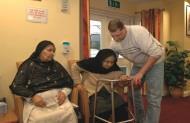Hard choices have to be faced to ensure our health and social care systems meet the challenges of the 21st century, says commission chair Kate Barker
It was a surprise to be invited by the King’s Fund to chair an independent commission on the future of health and social care; health is a new topic for me.
‘If the nature of illness and care needs today had faced the architects of the 1948 settlement, they would have arrived at different conclusions’
As an economist, I often hear the charge that we see the world simply in terms of money, or of markets. That is not true – like anyone else, we are concerned about the human condition. It is the human stories of anguish and distress caused by how the NHS and social care operate now which have really motivated the commission’s interim report. But economists are realists. If this situation is to be improved, then as a society some hard choices have to be faced.

The issues are clear. There is a great contrast between healthcare – largely provided free at the point of use with a ringfenced budget – and social care – funded through local authorities and heavily means tested (this will still be true even after the Dilnot reforms). These different systems do not work well together and are failing to rise to the challenges of an ageing population within which there are more people with long-term conditions.
Further, technological change is making it harder to draw a sharp line between health and social care.
What strikes me most is how similar needs do not receive equal treatment – the most obvious example being dementia, where the costs of care fall almost entirely on individuals and their families, as eligibility for public funding is so limited.
It is the commission’s contention that if the nature of illness and care needs today had faced the architects of the 1948 settlement, they would have arrived at different conclusions. Our stake in the ground is to move towards a single, ringfenced budget for health and social care, with services singly commissioned and entitlements better aligned.
Rising expectations
This would imply more generous funding for social care, so that the risk of needing it is shared to a greater extent, as it already is for healthcare. Funding will also need to respond to rising expectations – social care in 20 years will need to be better as well as more freely available. Of course, much caring will inevitably be done by family, friends and the voluntary sector. But they too need a better settlement, to be confident that their contribution is set within a clearer system that works around individual patients and service users.
Talk of increased funding may seem hugely ambitious in this age of austerity. As economic growth resumes, there is more scope to meet the costs of rising health and social care needs from taxation. But even with optimistic assumptions for improving productivity in the NHS and modest scope for efficiencies, if we achieve better integration with social care, it is unlikely these costs could be fully met without significant changes to financing.
The key question is who will pay this bill. Today health and social care together cost about 10 per cent of GDP, with about a fifth of this total privately funded. Over and above this is the work of unpaid carers.
‘If we achieve better integration with social care, it is unlikely these costs could be fully met without significant changes to financing’
In our final report, the commission will address two big questions: how should entitlement to public support be more closely aligned between health and social care, and how should any new entitlements be funded?
We will look at the options against clear criteria. These include: whether the proposal is equitable, whether it will support service efficiency, whether it is financially sustainable, and if it strikes an appropriate balance between collective and individual responsibility. But crucially the outcome of any changes must be a system which responds better to the needs and preferences of individuals and carers, and which they can understand and navigate.
User charges
There are many ways in which entitlements could be changed, and many ways in which funding could be raised. In our interim report, we set out a number of options on the latter, although we have applied our criteria to rule out both a wholesale switch to social insurance and tax relief on private health insurance.
Remaining options range from proposals to change taxation for everyone (such as a dedicated tax for health and social care), to ideas which would raise the tax burden on, or reduce the benefits available to, the elderly population. Other proposals include ways of increasing user charges for aspects of healthcare which today are provided from the public purse – although it should be clear that these would still leave the NHS very largely free at the point of use.
These are uncomfortable options. But the picture we paint is of health and social care systems that, unreformed, are heading in an unsustainable direction both for the public finances and for individuals and their families at times of need.
We look forward to responses to our views and the financing options, in order that the final report can propose a clear vision for the future of health and social care in the 21st century.
Kate Barker is chair of the commission on the future of health and social care in England
- To respond to the commission’s call for evidence go to www.kingsfund.org.uk/barkerevidence


























3 Readers' comments